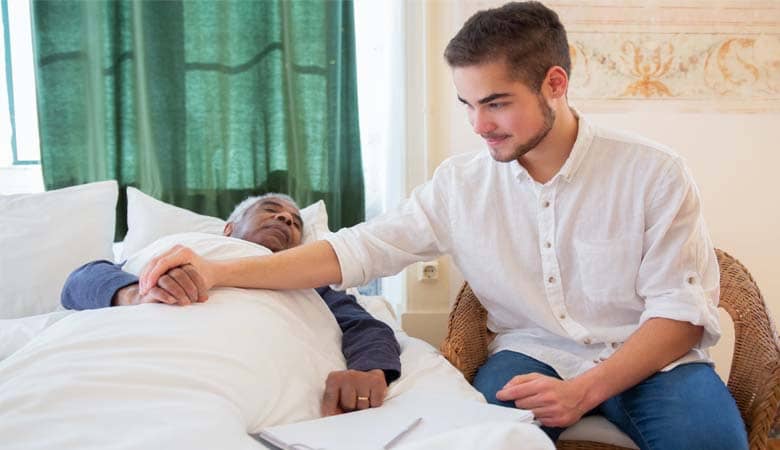Six Tips to Take Care of Bedridden Senior Adults at Home

It has long been ingrained in society that getting older gives you a carefree life free of work and personal responsibilities. However, most seniors’ experiences do not correspond with this perception. Retiring from a career alone does not guarantee a trouble-free life.
Seniors’ life can become an uphill battle when confronted with daunting health challenges, decreased physical mobility, and chronic or lifestyle-related ailments.
As a result, providing a loved one with the care and comfort they deserve when confined to bed due to illness, injury, or age-related limitations necessitates a thoughtful approach. Whether you are a family or a professional caregiver, recognizing the unique requirements of bedridden seniors and implementing the right strategies can significantly improve their quality of life.
This article will review six essential recommendations for providing physical care, emotional support, and a secure and pleasant environment for bedridden seniors at home.
- Become Familiar with Medical Equipment
To provide effective care, you must become familiar with the medical equipment used to ensure the comfort and treatment of your bedridden loved ones. It may include understanding how to use respiratory support devices, feeding tubes, vital signs monitors, specialized beds, and automated external defibrillator (AED) devices, especially when your senior adult is suffering from cardiovascular disease.
Due to technological advancement, many lightweight and user-friendly devices are available, like the Avive AED Connect, which you can keep at home to deal with emergencies. Avive AED Connect restores a regular heart rhythm during sudden cardiac arrest (SCA) episodes triggered by irregular heartbeats (arrhythmias). Suppose you have a bedridden senior family member with a history of cardiovascular disorders. In that case, it may be worth investing in this device. Besides, if you want to know the Avive Connect AED price, you should check online or contact the dealer directly.
- Ensure a Comfortable Environment
For the well-being of older adults, being confined to their beds, you must provide them with a cozy setting.
Ensure the bed is clean to provide a crisp and comfortable resting place. To avoid pain and pressure sores, consider selecting a comfortable mattress with the right amount of cushioning. Use soft, tidy bedding that is frequently washed and replaced, such as blankets, pillows, and sheets.
The room should be well-ventilated, allowing fresh air to circulate and maintaining an optimal temperature that suits their preferences. Moreover, adding personal touches like family photos, artwork, or everyday items can bring a sense of familiarity and comfort to their surroundings.
- Manage Medication
Managing medicines is critical to providing care for a bedridden senior adult. It is essential to keep track of their medications, including schedules and dosage instructions. Consider the following suggestions when organizing their medications:
- Ensure that medications are kept out of the reach of pets and children in a secure location.
- Dispose of any medications regularly that have passed their expiry dates.
- To get answers to any questions or concerns about medication, you should talk to healthcare professionals like pharmacists or doctors.
- Be on the lookout for any side effects or changes in the senior’s condition, and let the medical team know as soon as possible.
- To prevent changes in the medication schedule, make sure any new prescriptions are filled promptly.
You can improve the senior’s health and well-being by being organized and paying attention to medication management, ensuring they receive the right dosages at the right times.
- Promote Proper Nutrition and Hydration
Ensuring a bedridden senior receives sufficient nourishment and hydration is essential to their recovery.
Start with providing a well-balanced food that satisfies all their dietary requirements and is according to their physician’s suggestion. Give a range of nutrient-rich foods, such as fruits, vegetables, whole grains, lean proteins, and dairy or dairy substitutes. If required, alter the food’s texture to ensure they can easily chew and swallow it.
To account for their decreased activity level, consider meals that are frequent and in smaller portions. To avoid dehydration, encourage the elder to consume liquids regularly. Provide them water, juices, herbal teas, or other flavored drinks. Consult a speech therapist for advice on thickening drinks if swallowing food is difficult. Closely check their weight, appetite, and general nutritional intake. If there are any changes or concerns, consult a healthcare provider.
- Provide Emotional Support
Being confined to a bed can cause feelings of loneliness, dissatisfaction, and even depression; therefore, it is essential to provide companionship and understanding. Spend time with the seniors, talking to them about important things and actively listening to their thoughts and feelings. Create an environment where they can express themselves and voice their concerns without fear of judgment. Recognize any challenges they may be facing and show empathy and reassurance.
Express genuine interest in their experiences, memories, and stories. It can help them feel connected and uplift their spirits. Encourage them to keep up with social associations through audio and video calls or visits from friends and family, as friendly collaboration is important.
Additionally, you can help them indulge in mind-stimulating activities like reading books, puzzles, or relaxing music, potentially boosting their mood and overall mental health.
- Prevent Bedsores
Bedsores, occasionally referred to as pressure ulcers, are lesions that appear on the skin after spending a lot of time sitting or lying in one position. Certain body parts, such as the buttocks, legs, and thighs, can undergo skin breakdown and eventual separation if subjected to continuous pressure. It can result in extreme discomfort, pain, infections, and other consequences that could be life-threatening and decrease a person’s lifetime.
When caring for a bedridden senior citizen, bedsores must be avoided. Fortunately, bedsores are simple to avoid! You can reduce the risk by doing the following:
- Regularly reposition the individual, especially if they spend much time in bed.
- Encourage the person to adjust their position on their own whenever possible.
- Be vigilant in checking for bedsores in common areas such as the heels, hips, ankles, and tailbone. Detecting them early is crucial in effective prevention.
Conclusion
Caring for bedridden senior adults at home demands patience, compassion, and attention to their emotional, physical, and social needs. You can provide the best care possible by establishing a comfortable environment, preventing bedsores, ensuring proper nutrition and hydration, providing emotional support, managing medications, and seeking assistance when needed. Remember that different people have different needs, so it’s important to communicate with their healthcare providers to provide personalized care. By implementing these suggestions, you can improve the quality of life of bedridden seniors and create a nurturing and supportive environment in their homes.




